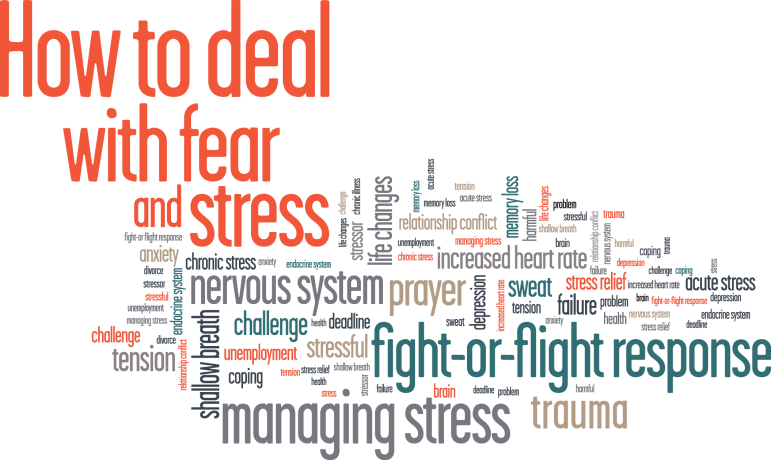Our world and our lives can seem perpetually on the brink of disaster. How can we survive the constant bombardment of anxiety, fear and stress?
If Google searches are any clue, anxiety has been growing. Over the past eight years, searches for “anxiety” have more than doubled.
And 26 percent of Americans reported a “great deal” of stress in the previous month, and 49 percent had a major stressful event in the past year (“The Burden of Stress in America,” NPR/Robert Wood Johnson Foundation/Harvard School of Public Health). In the United Kingdom, a Labour Force Survey states that “in 2014/15 stress accounted for 35% of all work related ill health cases and [9.9 million days, equivalent to] 43% of all working days lost due to ill health.”
And there’s plenty to be worried, fearful and stressed about. News outlets spew forth reports of terror attacks, racial tensions, violent crime, gang turf wars, government corruption and spreading regional conflicts killing hundreds of thousands and forcing millions of refugees from their homes. Then there’s the real threat that hot spots will explode and lead to world war, with nuclear, chemical and biological weapons in play.
And even closer to home, many face chronic illnesses, burgeoning debt burdens, broken relationships, unending frustrations and the growing nastiness and immorality plaguing our communities and families.
So we feel a constant state of anxiety and stress, with sudden spikes of fear.
Our bodies are designed to handle danger situations by going into crisis mode—what is often called the fight-or-flight response.
However, when the fear is chronic—when anxiety and stress overwhelm us regularly—the body and mind can be taxed to the limit by unending crises. Our mental, emotional and physical health can be at risk.
So, how can we better handle fear, anxiety and stress?
First let’s examine the story of two men who faced crises and responded by fleeing or fighting. How did our Creator reshape their responses in healthy ways?
Then we’ll look at additional physical and spiritual factors that can help us deal with—and even grow—through our times of stress.
Elijah’s flight
The prophets of God did not live easy lives. They were the original ones called to speak truth to those in power—at the risk of their own lives. God told Elijah to take a message to evil King Ahab and the people who no longer respected God. God performed an awesome miracle, sending fire from heaven to convince the people He was truly God.
Elijah experienced a great victory over the enemies of God! But almost immediately those enemies struck back. Wicked Queen Jezebel sent a messenger promising to have Elijah put to death by the next day.
Elijah knew her ruthless reputation, and he panicked. He ran for his life as fast and as far away as he could.
There he prayed, “It is enough! Now, LORD, take my life” (1 Kings 19:4). He preferred to die at God’s merciful hand than to be killed by malicious Jezebel.
But God patiently and lovingly redirected Elijah’s terror. God asked, “What are you doing here, Elijah?” (verse 9).
Elijah reminded God, “I have been very zealous for the LORD God of hosts; for the children of Israel have forsaken Your covenant, torn down Your altars, and killed Your prophets with the sword. I alone am left; and they seek to take my life” (verse 10).
When we face fear and stress, God also wants us to refocus on Him and on the work He has for us to do.
After revealing Himself to Elijah through miracles, God asked Elijah the same question again and got the same answer. Then God gave Elijah new marching orders. Instead of focusing on the dangers, Elijah should go back to work doing God’s will. And God reassuringly explained that Elijah was not alone—“yet I have reserved seven thousand in Israel, all whose knees have not bowed to Baal” (verse 18).
When we face fear and stress, God also wants us to refocus on Him and on the work He has for us to do. That work involves thousands of others who are similarly working to prepare for Jesus Christ’s return—the only real hope this troubled world has. Read more about this in our articles “What Is the Mission of the Church?” and “Our Future Hope.”
Peter’s fight
The disciples did not fully understand what Jesus had to do during His first coming. They knew He would be King, but they didn’t grasp that as Savior He would have to die to pay for our sins.
So when the traitor Judas Iscariot brought armed men to arrest Jesus, Peter was ready to fight to protect his King. He felt the fear but didn’t run. He came out swinging.
“Then Simon Peter, having a sword, drew it and struck the high priest’s servant, and cut off his right ear” (John 18:10). Was Peter really aiming for the ear—or was the servant lucky he ducked?
But what happened next took the fight out of Peter! Jesus told him, “Put your sword into the sheath” because this was God’s will (verse 11). Jesus said, “‘Permit even this.’ And He touched his ear and healed him” (Luke 22:51).
Still, Peter did not flee, but followed Jesus to where He was being tried. Peter knew his own life was in danger since he was the one who attacked the high priest’s servant. Now, though, he knew Jesus didn’t want him to fight, and perhaps he was even wondering if God would protect him.
Then he was asked three different times if he was a follower of Jesus, and he denied his Savior three times! When he realized this was exactly as Jesus had predicted, “he went out and wept bitterly” (Matthew 26:75).
Peter came to recognize he could not rely on his own courage and self-will to fight the fearful events enveloping him. Jesus redirected him to look for God’s will. When we follow God’s will, we can trust in God for the protection and courage we need.
Jesus gave Peter further direction after He was resurrected. Paralleling Peter’s three denials, Jesus asked him three times if he loved Him. And three times Jesus pointed Peter to his job—to “feed My sheep” (John 21:17).
Physical factors
Fear and stress definitely have physical components, from the danger itself to our body’s response. For example, our level of rest and exercise can be important factors in how we react.
The old saying (often attributed to American football legend Vince Lombardi) is true, “Fatigue makes cowards of us all.” God even included rest in His commandments for our benefit. (See more about the weekly Sabbath rest in our free booklet The Sabbath: A Neglected Gift From God.)
And regular exercise can build up our body’s resilience and help us control our feelings of stress.
The Anxiety and Depression Association of America says, “Scientists have found that regular participation in aerobic exercise has been shown to decrease overall levels of tension, elevate and stabilize mood, improve sleep, and improve self-esteem. Even five minutes of aerobic exercise can stimulate anti-anxiety effects.”
But physical efforts can only go so far in avoiding disaster or controlling stress. In our world there are dangers beyond our control or even comprehension.
Thankfully the Bible points to a Source of help that transcends the physical.
Spiritual peace of mind
God offers not just practical help but also a spiritual awareness that gives us His perspective. From God’s vantage point, all that we face—all that our world faces—is not out of control, but totally within His control. He has a plan to soon solve humanity’s most insolvable problems. No overwhelming force or inexorable crisis is a match for the all-powerful Creator.
From God's vantage point, all that we face—all that out world faces—is not out of control, but totally within His control.
Consider some biblical realities for those who commit to following God and trusting in Him.
When we feel worry and anxious care:
“Therefore do not worry, saying, ‘What shall we eat?’ or ‘What shall we drink?’ or ‘What shall we wear?’ … For your heavenly Father knows that you have need of all these things. But seek first the kingdom of God and His righteousness, and all these things shall be added to you” (Matthew 6:31-33).
“Therefore humble yourselves under the mighty hand of God, that He may exalt you in due time, casting all your care upon Him, for He cares for you” (1 Peter 5:6-7).
When we feel fear that we are adrift and things are out of control:
“He shall cover you with His feathers, and under His wings you shall take refuge; His truth shall be your shield and buckler. You shall not be afraid of the terror by night, nor of the arrow that flies by day, nor of the pestilence that walks in darkness, nor of the destruction that lays waste at noonday” (Psalm 91:4-6).
“Being confident of this very thing, that He who has begun a good work in you will complete it until the day of Jesus Christ” (Philippians 1:6).
“This hope we have as an anchor of the soul, both sure and steadfast” (Hebrews 6:19). Hebrews 11:35-39 illustrates many faithful people of God who endured desperate conditions by focusing on the hope of their resurrection at the return of Jesus Christ.
When we feel troubled and stressed:
“These things I [Jesus] have spoken to you, that in Me you may have peace. In the world you will have tribulation; but be of good cheer, I have overcome the world” (John 16:33).
“You will keep him in perfect peace, whose mind is stayed on You, because he trusts in You” (Isaiah 26:3).
“Be anxious for nothing, but in everything by prayer and supplication, with thanksgiving, let your requests be made known to God; and the peace of God, which surpasses all understanding, will guard your hearts and minds through Christ Jesus” (Philippians 4:6-7). Verse 8 goes on to advise meditating on true, pure and virtuous things—another key to peace of mind.
Read more in our Life, Hope & Truth article “What Is Meditation?”
Stress-Reduction Action Steps
What can we learn and do from these biblical stories and encouraging passages?
- Pray for God’s protection and peace of mind.
- Cast your cares on Him—and don’t take them back.
- Strive to get healthy amounts of rest and exercise, especially the biblically mandated Sabbath rest.
- Meditate on true, pure and virtuous things.
- Seek to do God’s will, knowing He has a plan to solve all these problems and remove all the evils.
- Focus on doing your part in doing God’s work of preparing for Jesus Christ’s return.
- Study God’s promises and remember what He has done so you can grow in faith.
Learn more about how to claim God’s promises in the articles in the “What Is Faith?” section of Life, Hope & Truth (lifehopeandtruth.com/change/faith/).






